
Should People Be Banned From Flying More Than Four Times In Their Lives?
A poll from research firm Consumer Science and Analytics Institute (CSA) found a shocking number of French citizens would support banning people from flying more than four times in their lives due to the climate emergency.
The poll surveyed 1,010 French residents over the age of 18. It found 41% of respondents would support such wide-ranging restrictions aimed at reducing carbon emissions. The figure climbed to 59% support among 18- to 24-year-olds.
The suggested limit on flying would apply to air travel for business and pleasure. While a majority of respondents opposed the four-flight lifetime maximum, 64% said they would be willing to restrict their air travel in the near or medium term.
Bold Actions For A More Sustainable Aviation Sector
It appears support for air travel restrictions remains far higher among younger age groups. Aviation is one of the fastest-growing sources of emissions. If the entire sector were a country, it would be one of the top 10 carbon-polluting countries on the planet.
In 2010, the aviation industry catered to some 2.4 billion passengers worldwide. In the next 15 years, the number is forecast to rise to 8.2 billion. With bold actions, we can create a greener and more sustainable aviation sector that supports climate action.
Keep Reading
Is Flying Less The Solution?
As it remains difficult to reduce emissions from the aviation sector, flying less is the only way to meet goals in the critical decade before 2030. It could mean taking a more sustainable mode of transport or changing destinations to ones that can be reached by less climate-intensive means.
Flying less could also mean going on longer holidays instead of several short, carbon intensive trips and teleconferencing, rather than attending business meetings in person. The COVID lockdowns confirmed those long-held ideas of the need to fly for work no longer stand.
Climate activists across the globe have been pushing for bold restrictions. As policymakers, business leaders, experts and other stakeholders consider comprehensive climate plans for aviation, they should balance the action on five pillars, including
1. Increasing aircraft fuel efficiency
2. Developing more sustainable aviation fuels
3. Promoting alternatives to air travel
4. Removing carbon from the atmosphere through investment in renewable energy and nature-based climate solutions
5. Mitigating the effects of non-CO2 exhaust in the atmosphere




